When both eyes are misaligned, it is called Crossed Eye or Strabismus. This might be unnoticeable, rarely or often. Unnoticeable crossed eyes can only be seen during the examinations and the perception of depth which is the highest level of binocular vision is normal. Crossed eye syndrome usually starts rarely and evolves to a permanent situation. In turned crossed eye syndromes becomes permanent in months however it takes a long time for the out turned crossed eyes to become permanent.
Although it is not an inherited condition, it is mostly observed in the patients whose family has lazy eye, high refractive failure problems. In situations related to muscle paralysis with elderly patients, it is mostly because of high blood pressure, diabetes, coronary diseases, head traumas. It might also be congenital. When it is not caused congenitally or by muscle paralysis, the reasons might be myopia, hypermetropia or astigmatism. On some occasions, it might be caused by some clinical features such as Duane Syndrome, Brown Syndrome
Crossed eyes syndrome and lazy eye syndrome can be cause and affect relation. One crossed eye might lead to lazy eye syndrome or on some occasions, lazy eye syndrome might end up with crossed eyes syndrome.
DIFFERENT TYPES OF CROSSED EYES (STRABISMUS)
In certain types of strabismus, treatment with eyeglasses is successful. It is treated very well when the child wears the glasses. Later stages, the patient learns to control the eyes and doesn’t need to wear glasses anymore.
On some occasions, the glasses can partially help the strabismus. Then, a surgical intervention is needed.
During the operation, the muscles which lead to strabismus might be replaced, shortened, or strengthened. Strabismus is not an esthetical concern but a serious problem which might lead to visual impairment when not treated.
Earlier the treatment is started, more successful it is. A surgical intervention in the early ages is highly recommended however it is also possible to have the treatment as adult.
Adults can also adapt to use both eyes just like infants after the treatments
Macula Hole Treatment
Retinal layer of the eye consists of nerve cells which transmits the light coming from outside to the brain. If the eye is like a camera, retina is the film. Macular area is just in the middle of this section. In the middle of the macula, there is the Foveo which is at the size of a pinhead where the light focuses. Foveo, also known as the yellow spot, gives the retina layer the abilities of central vision and detailed vision.
Macular hole is the tear which appears right in the middle of the centre of vision. A black dot appears in the vision of the patient which affects it badly.
Recognizing the faces, reading newspapers or such activities are highly affected because of this condition. Since the other parts of the retina are normal, environmental vision is not affected.
The most common reason of the macular hole is called “idiopathic” which is not related to anything and happens by itself. Age is somehow related to it. Other than that, traumas on the eye might also lead to macular hole.
Even the factors which lead to macular hole are not exactly know, it is clear that the changes on the eye are mostly related to age. The intra ocular fluid, called Vitreous, shrinks by time, applies a pull force to the centre of sight and this force creates a hole on this area.
Treatment of macular hole with medicine is not possible, the only treatment can be done is vitrectomy surgery. The vitreous fluid is cleaned, the membranes are pealed, and a gas is injected into the eye. The vision might be lower after the surgery because of the gas inside the eye and the vision is corrected when the intraocular fluid replaces the gas by itself. The success rate of the operation, which means closing the macular hole is %80-90. However, the rate is lower after the trauma or long-term holes. Macular hole surgery can be performed under local or general anaesthesia. It is recommended to sleep on tummy for a while after the surgery to be sure that the hole is completely closed.
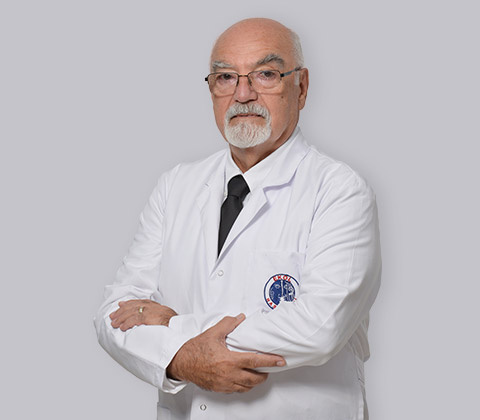 He was born in Ankara in 1945. He attended TED Ankara College, İzmir Bornova Anatolian High School and Ege University, Faculty of Medicine between 1963 and 1969, respectively. Upon his graduation, he started his specialization at Ege University, Faculty of Medicine, Eye Diseases Department and assumed the title of Eye Diseases Specialist in 1971. Between 1974 and 1975, he performed his military service as an ophthalmologist in Hatay Military Hospital in İzmir. After that, he was educated on Retinal Diseases and Lasers in Ophthalmology Clinic of the Faculty of Medicine at University of Gant, Belgium for 1 year. In 1977, he assumed the title of Associate Professor of Ophthalmology, and he founded and operated Retina and Contact Lenses units in Ege University, Faculty of Medicine, Department of Eye Diseases. In 1982 he became a Professor of Eye Diseases. Between 1992 and 2000, he served as the Head of Department of Eye Diseases, Faculty of Medicine, Ege University. In the meantime, he published 3 books and more than 150 domestic and foreign scientific papers, and about 170 papers in national and international congresses. He is married to Dr. Nigar Erbakan and has two sons.
He was born in Ankara in 1945. He attended TED Ankara College, İzmir Bornova Anatolian High School and Ege University, Faculty of Medicine between 1963 and 1969, respectively. Upon his graduation, he started his specialization at Ege University, Faculty of Medicine, Eye Diseases Department and assumed the title of Eye Diseases Specialist in 1971. Between 1974 and 1975, he performed his military service as an ophthalmologist in Hatay Military Hospital in İzmir. After that, he was educated on Retinal Diseases and Lasers in Ophthalmology Clinic of the Faculty of Medicine at University of Gant, Belgium for 1 year. In 1977, he assumed the title of Associate Professor of Ophthalmology, and he founded and operated Retina and Contact Lenses units in Ege University, Faculty of Medicine, Department of Eye Diseases. In 1982 he became a Professor of Eye Diseases. Between 1992 and 2000, he served as the Head of Department of Eye Diseases, Faculty of Medicine, Ege University. In the meantime, he published 3 books and more than 150 domestic and foreign scientific papers, and about 170 papers in national and international congresses. He is married to Dr. Nigar Erbakan and has two sons. 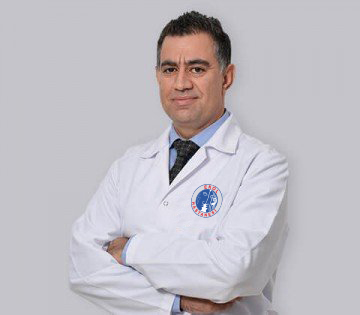 Dr Esat Çınar was born in Diyarbakır in 1976. He started İstanbul University, Faculty of Medicine in 1997 and graduated in 2003. He completed his speciality degree between 2003 and 2009 at İzmir Ege University, Faculty of Medicine, Ophthalmology Department. He was in charge of Glaucoma and Cornea Departments as a Deputy Associate Professor in İzmir University Hospital Faculty of Medicine, Department of Ophthalmology. He studied “Keratoplasty” in Ege University, Faculty of Medicine for 6 months (also known as “eye transplant”). He also was in charge of the controls of the premature babies’ in İzmir University Ophthalmology Department. He attended the course for vivisection both in clinical and laboratory fields for one month. His special interests are; Cataract surgery (multifocal, trifocal and thoric intraocular lenses), Cataract surgery with laser (Femtosecond Cataract), Keratoplasty, glaucoma surgery (non-penetrant surgeries such as viscocanalostomy, deep sclerotomy), Excimer Laser Surgeries (Lasik, Lasek, PRK), medical retinal diseases. He has many published articles in international indexes. He has many verbal and written presentations in national and international scientific meetings. He is an active member of the Turkish Association for Ophthalmology. He speaks fluent English and has one child.
Dr Esat Çınar was born in Diyarbakır in 1976. He started İstanbul University, Faculty of Medicine in 1997 and graduated in 2003. He completed his speciality degree between 2003 and 2009 at İzmir Ege University, Faculty of Medicine, Ophthalmology Department. He was in charge of Glaucoma and Cornea Departments as a Deputy Associate Professor in İzmir University Hospital Faculty of Medicine, Department of Ophthalmology. He studied “Keratoplasty” in Ege University, Faculty of Medicine for 6 months (also known as “eye transplant”). He also was in charge of the controls of the premature babies’ in İzmir University Ophthalmology Department. He attended the course for vivisection both in clinical and laboratory fields for one month. His special interests are; Cataract surgery (multifocal, trifocal and thoric intraocular lenses), Cataract surgery with laser (Femtosecond Cataract), Keratoplasty, glaucoma surgery (non-penetrant surgeries such as viscocanalostomy, deep sclerotomy), Excimer Laser Surgeries (Lasik, Lasek, PRK), medical retinal diseases. He has many published articles in international indexes. He has many verbal and written presentations in national and international scientific meetings. He is an active member of the Turkish Association for Ophthalmology. He speaks fluent English and has one child. 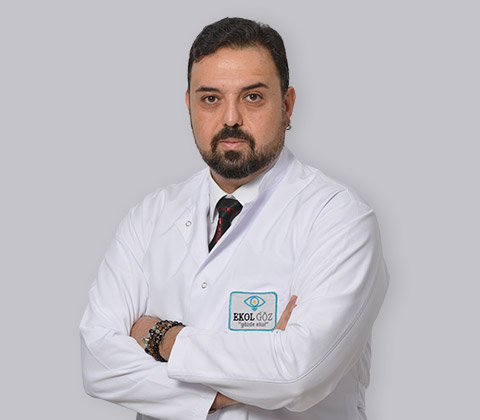 He was born in Izmir, in 1971. He attended summer school at Mids School of English, Eastbourn, England for learning a foreign language while he was in Bornova Anatolian High School and graduated with a high degree. He started his medical education at Ege University and continued with his specialization at JL Uni-Giessen, Germany, where he had the chance of working peer to peer with names such as Prof. Dr. Karl W. Jacobi, Prof Dr. Herbert Kaufmann, Prof. Dr. S. Pavlovic. Then, he found the opportunity to further his education in the field of refractive surgery by working with the most important names, such as Prof. Dr. T. Kohnen, JWG Uni-Frankfurt, Prof. Dr. I. Pallikaris, University of Crete, Prof Dr. Mahmut Kaşkaloğlu, Ege University Faculty of Medicine and Kaşkaloğlu Eye Hospital. Besides, he did scientific studies about medical glaucoma treatment, which is his other field of interest, with Ass. Prof. Dr. Karl Georg Schmidt, CGC Uni-Dresden. He is a member of DOG, ESCRS, ISRS of the AAO and TOD. He is married and has one child.
He was born in Izmir, in 1971. He attended summer school at Mids School of English, Eastbourn, England for learning a foreign language while he was in Bornova Anatolian High School and graduated with a high degree. He started his medical education at Ege University and continued with his specialization at JL Uni-Giessen, Germany, where he had the chance of working peer to peer with names such as Prof. Dr. Karl W. Jacobi, Prof Dr. Herbert Kaufmann, Prof. Dr. S. Pavlovic. Then, he found the opportunity to further his education in the field of refractive surgery by working with the most important names, such as Prof. Dr. T. Kohnen, JWG Uni-Frankfurt, Prof. Dr. I. Pallikaris, University of Crete, Prof Dr. Mahmut Kaşkaloğlu, Ege University Faculty of Medicine and Kaşkaloğlu Eye Hospital. Besides, he did scientific studies about medical glaucoma treatment, which is his other field of interest, with Ass. Prof. Dr. Karl Georg Schmidt, CGC Uni-Dresden. He is a member of DOG, ESCRS, ISRS of the AAO and TOD. He is married and has one child. 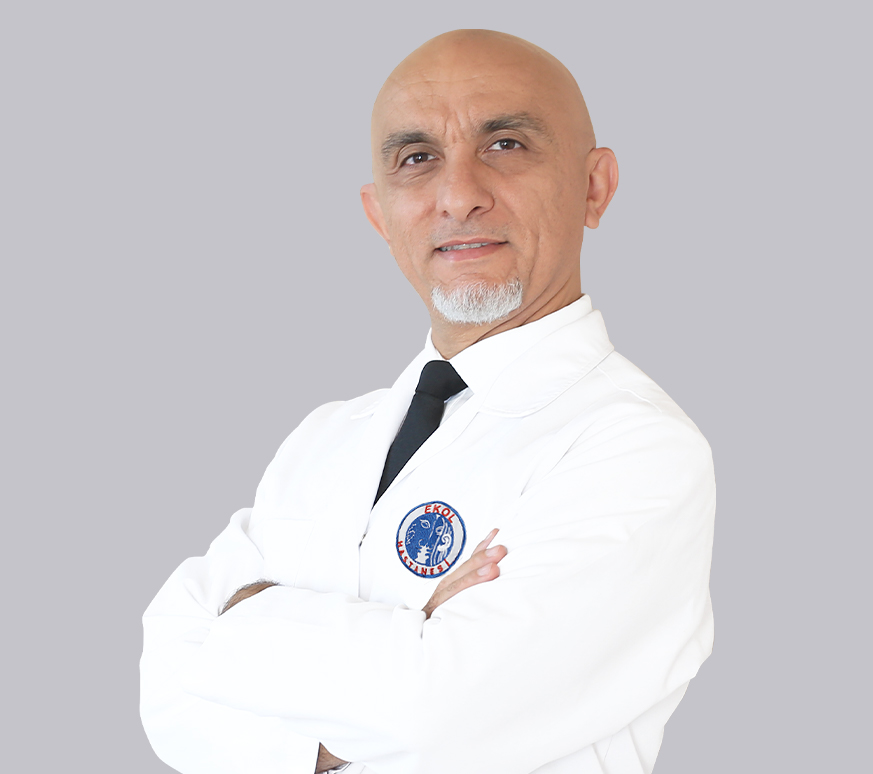 He graduated from Hacettepe University Faculty of Medicine in 1998. He completed his speciality in İzmir Dokuz Eylül University Faculty of Medicine Department of Eye Diseases between 1998 and 2002. He studied Retinal Surgeries in Munich Ludwig – Maximillian University Faculty of Medicine, Department of Eye Diseases. Special Interests: Cataract Surgeries (Multifocal, Trifocal, Toric Intraocular Lenses), Laser Cataract Surgeries (Femtosecond, Laser Cataract), Excimer Laser Surgeries (Lasik, Lasek, PRK) and Medical & Surgical Retinal Surgeries, Eyelid Surgeries. He has many articles published which were also scientifically indexed. He has oral and poster presentations in national & international science meetings. He is an active member of Turkish Society of Ophthalmology. He speaks English & German well, and married with 2 children.
He graduated from Hacettepe University Faculty of Medicine in 1998. He completed his speciality in İzmir Dokuz Eylül University Faculty of Medicine Department of Eye Diseases between 1998 and 2002. He studied Retinal Surgeries in Munich Ludwig – Maximillian University Faculty of Medicine, Department of Eye Diseases. Special Interests: Cataract Surgeries (Multifocal, Trifocal, Toric Intraocular Lenses), Laser Cataract Surgeries (Femtosecond, Laser Cataract), Excimer Laser Surgeries (Lasik, Lasek, PRK) and Medical & Surgical Retinal Surgeries, Eyelid Surgeries. He has many articles published which were also scientifically indexed. He has oral and poster presentations in national & international science meetings. He is an active member of Turkish Society of Ophthalmology. He speaks English & German well, and married with 2 children. 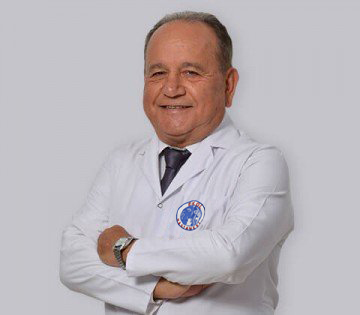 He graduated from Istanbul University, Faculty of Medicine and completed his specialty training in S.S.K Istanbul Hospital in 1984. He worked at Çanakkale State Hospital between 1984 and 2007. After 2007, he worked in private sector health units. He is an active member of The Turkish Ophthalmology Association and American Cataract and Refractive Association. Anterior segment (cataract) medical retina, glaucoma and contact lens are his areas of interest. He has a good command of English.
He graduated from Istanbul University, Faculty of Medicine and completed his specialty training in S.S.K Istanbul Hospital in 1984. He worked at Çanakkale State Hospital between 1984 and 2007. After 2007, he worked in private sector health units. He is an active member of The Turkish Ophthalmology Association and American Cataract and Refractive Association. Anterior segment (cataract) medical retina, glaucoma and contact lens are his areas of interest. He has a good command of English. 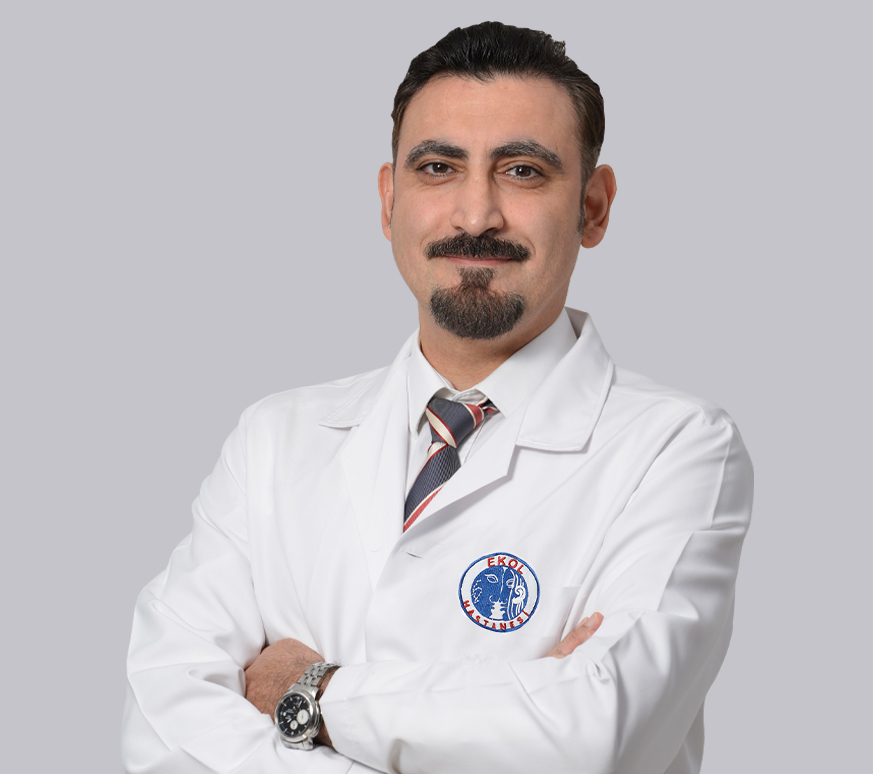 He was born in 1977. He graduated from Ege University. Fields of Interest: Cataract Surgery (Monofocal, Multifocal, Trifocal, EDOF, Toric Lenses) Excimer Laser (Femtosecond LASIK, PRK, No-Touch) ICL Keratoconus - Crosslink, Hard Contact Lens Application, Intrastromal Corneal Ring Strabismus Surgery Oculoplastic Surgery (Eyelid Aesthetic Surgery, Ectropium, Entropium, Ptosis, Probing, Tear Duct Obstruction) Pterygium Surgery (with Autograft) Glaucoma Medical and Laser Therapy Retinal Diseases (Intraocular Drug Injections, Diabetic Retinopathy, Yellow Spot Disease, Retinal Tears) Soft Contact Lens Inspection and Application He is a member of Turkish Association of Ophthalmology. He is married.
He was born in 1977. He graduated from Ege University. Fields of Interest: Cataract Surgery (Monofocal, Multifocal, Trifocal, EDOF, Toric Lenses) Excimer Laser (Femtosecond LASIK, PRK, No-Touch) ICL Keratoconus - Crosslink, Hard Contact Lens Application, Intrastromal Corneal Ring Strabismus Surgery Oculoplastic Surgery (Eyelid Aesthetic Surgery, Ectropium, Entropium, Ptosis, Probing, Tear Duct Obstruction) Pterygium Surgery (with Autograft) Glaucoma Medical and Laser Therapy Retinal Diseases (Intraocular Drug Injections, Diabetic Retinopathy, Yellow Spot Disease, Retinal Tears) Soft Contact Lens Inspection and Application He is a member of Turkish Association of Ophthalmology. He is married. 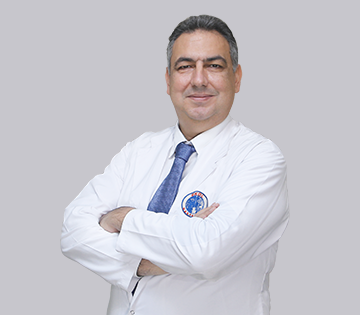 Dr. Kaan Okan Erdem was born in İzmir, in 1968. He finished middle school in Private İzmir Türk College and high school in Atatürk High School. He studied medicine in Selçuk University Faculty of Medicine. He is an active member of European Association of Cataract and Refractive Surgery, European Association of Ophthalmic Plastic and Reconstructive Surgery. He is interested in cataract, refractive surgery, oculoplastic and reconstructive surgery (upper and lower eyelids, tumour removals around the eye, entropium, ectropium ptosis, blepharoplasty), eye ultrasound, medical retinal and glaucoma. He speaks fluent English and married with 2 children.
Dr. Kaan Okan Erdem was born in İzmir, in 1968. He finished middle school in Private İzmir Türk College and high school in Atatürk High School. He studied medicine in Selçuk University Faculty of Medicine. He is an active member of European Association of Cataract and Refractive Surgery, European Association of Ophthalmic Plastic and Reconstructive Surgery. He is interested in cataract, refractive surgery, oculoplastic and reconstructive surgery (upper and lower eyelids, tumour removals around the eye, entropium, ectropium ptosis, blepharoplasty), eye ultrasound, medical retinal and glaucoma. He speaks fluent English and married with 2 children. 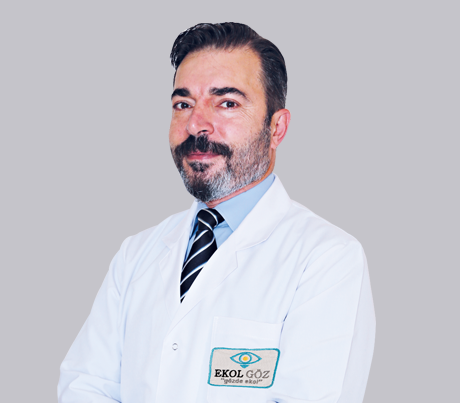 He graduated from Dokuz September University Faculty of Medicine in 1996. He completed his specialized education in the Department of Ophthalmology of the Faculty of Medicine of the Aegean University between 1996-2001 and earned the title of ophthalmologist Dec. He has published numerous scientific articles that fall into international scientific indexes. There are numerous oral and poster presentations to national and international scientific meetings. He is an active member of the Turkish Ophthalmology Association (Tod). He speaks good English, Opr. Dr. Uğur Karagöz is the father of 2 children. Special interests: Cataract surgery (multifocal, trifocal, Toric intraocular lenses) Cataract surgery with laser (Femtosecond Laser Cataract) Excimer laser surgeries (Lasik, Lasek, PRK) Medical and surgical Retina Eyelid Surgeries
He graduated from Dokuz September University Faculty of Medicine in 1996. He completed his specialized education in the Department of Ophthalmology of the Faculty of Medicine of the Aegean University between 1996-2001 and earned the title of ophthalmologist Dec. He has published numerous scientific articles that fall into international scientific indexes. There are numerous oral and poster presentations to national and international scientific meetings. He is an active member of the Turkish Ophthalmology Association (Tod). He speaks good English, Opr. Dr. Uğur Karagöz is the father of 2 children. Special interests: Cataract surgery (multifocal, trifocal, Toric intraocular lenses) Cataract surgery with laser (Femtosecond Laser Cataract) Excimer laser surgeries (Lasik, Lasek, PRK) Medical and surgical Retina Eyelid Surgeries 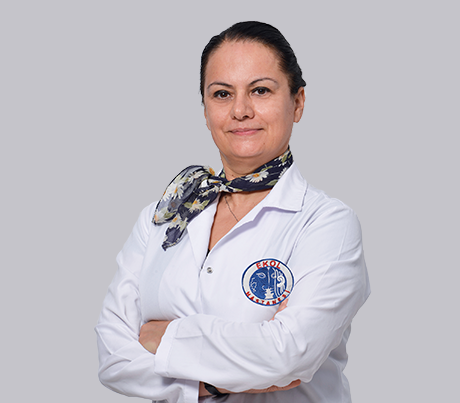 Born in Cyprus Serdarlı, he graduated from Nicosia Turkish High School. He graduated from Dokuz Eylul University Faculty of Medicine. He completed his specialization in Atatürk Health Site Yeşilyurt State Hospital with his thesis on the comparison of the rear camera lens application and the front camera lenses, which was started to be applied for the first time in the clinic under the management of Zühal Çakırca, the clinical chief. She worked as a contact lens center in İzmir for three years and then as chief physician at Karşıyaka Kızılay Fatma Kutluay Dispensary. He continued to work in Karşıyaka by establishing the Private Yalı Polyclinic in 2005 and the Private Yalı Eye Health Branch Center in 2007, his special interests are refraction and contact lenses. He is a member of the Turkish Ophthalmology Association.
Born in Cyprus Serdarlı, he graduated from Nicosia Turkish High School. He graduated from Dokuz Eylul University Faculty of Medicine. He completed his specialization in Atatürk Health Site Yeşilyurt State Hospital with his thesis on the comparison of the rear camera lens application and the front camera lenses, which was started to be applied for the first time in the clinic under the management of Zühal Çakırca, the clinical chief. She worked as a contact lens center in İzmir for three years and then as chief physician at Karşıyaka Kızılay Fatma Kutluay Dispensary. He continued to work in Karşıyaka by establishing the Private Yalı Polyclinic in 2005 and the Private Yalı Eye Health Branch Center in 2007, his special interests are refraction and contact lenses. He is a member of the Turkish Ophthalmology Association. 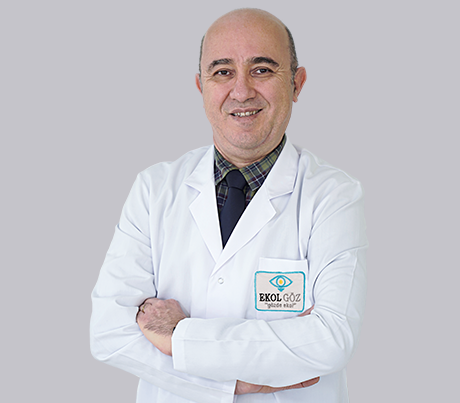 He graduated from Ege University Faculty of Medicine in 1989. Specialization he completed his education in Izmir Education and Research between 1991-1994. He completed his Ophthalmology Department at the Hospital. International A large number of scientific articles included in scientific indexes have been published. Numerous oral and poster presentations to national and international scientific meetings has a presentation. He is an active member of the Turkish Ophthalmology Association (TOD). Fluent in English, Opr. Dr. Gazi Duman is married and has two children. Special interests: Cataract Surgery (multifocal, trifocal, toric intraocular lenses) Cataract Surgery with Laser (Femtosecond Laser Cataract) Excimer Laser Surgery (Lasik, Lasek, PRK) Medical and Surgical Retina Eyelid Surgery Strabismus Surgery
He graduated from Ege University Faculty of Medicine in 1989. Specialization he completed his education in Izmir Education and Research between 1991-1994. He completed his Ophthalmology Department at the Hospital. International A large number of scientific articles included in scientific indexes have been published. Numerous oral and poster presentations to national and international scientific meetings has a presentation. He is an active member of the Turkish Ophthalmology Association (TOD). Fluent in English, Opr. Dr. Gazi Duman is married and has two children. Special interests: Cataract Surgery (multifocal, trifocal, toric intraocular lenses) Cataract Surgery with Laser (Femtosecond Laser Cataract) Excimer Laser Surgery (Lasik, Lasek, PRK) Medical and Surgical Retina Eyelid Surgery Strabismus Surgery 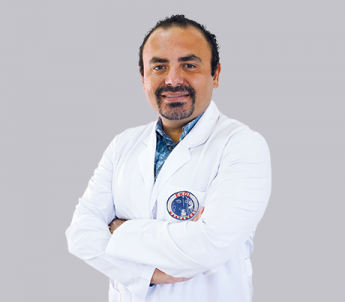 He graduated from Dokuz September University Faculty of Medicine in 2005. September 2005-2010, he completed his specialty education in the Department of Ophthalmology of the Faculty of Medicine of Dokuz Eylül University and earned the title of ophthalmologist. Dec. He has published a large number of scientific articles that have entered international scientific indexes. There are many oral and poster presentations to national and international scientific meetings. He is an active member of the Turkish Ophthalmology Association (TOD), the American Academy of Ophthalmology Association and the European Society of Cataract and Refractive Surgeons. He won the European Ophthalmology Qualification Exam (European Board of Ophthalmology) and became a FEBO. Opr, who is married and has 1 child. Dr. Hüseyin Aslankara speaks English well. Special interests: Retinal Diseases and Vitreoretinal Surgery Cataract Surgery (multifocal, trifocal, toric intraocular lenses) Cataract Surgery with Laser (Femtosecond Laser Cataract) Excimer Laser Surgeries (Lasik, Lasek, PRK) Strabismus Treatment and Surgery Children's Eye Diseases Eye Pressure (Glaucoma) Treatment and Operations Retinopathy of Prematurity and Its Treatment Eyelid Surgeries
He graduated from Dokuz September University Faculty of Medicine in 2005. September 2005-2010, he completed his specialty education in the Department of Ophthalmology of the Faculty of Medicine of Dokuz Eylül University and earned the title of ophthalmologist. Dec. He has published a large number of scientific articles that have entered international scientific indexes. There are many oral and poster presentations to national and international scientific meetings. He is an active member of the Turkish Ophthalmology Association (TOD), the American Academy of Ophthalmology Association and the European Society of Cataract and Refractive Surgeons. He won the European Ophthalmology Qualification Exam (European Board of Ophthalmology) and became a FEBO. Opr, who is married and has 1 child. Dr. Hüseyin Aslankara speaks English well. Special interests: Retinal Diseases and Vitreoretinal Surgery Cataract Surgery (multifocal, trifocal, toric intraocular lenses) Cataract Surgery with Laser (Femtosecond Laser Cataract) Excimer Laser Surgeries (Lasik, Lasek, PRK) Strabismus Treatment and Surgery Children's Eye Diseases Eye Pressure (Glaucoma) Treatment and Operations Retinopathy of Prematurity and Its Treatment Eyelid Surgeries